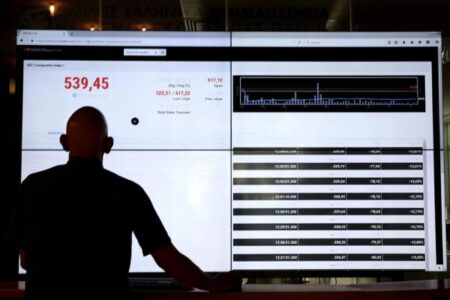When you buy through our links, Business Insider may earn an affiliate commission. Learn more
Sony has launched its latest lineup of 4K TVs, with sizes ranging from 43 inches to 85 inches. The new collection features LED, OLED, and Mini LED models, including the company’s brightest 4K TV ever.
To help shoppers easily determine where each new TV falls in the lineup, Sony has introduced a simplified naming scheme that puts its Bravia branding front and center. On the high end, there’s the Bravia 9 Mini LED, followed by the Bravia 8 OLED and Bravia 7 Mini LED, and capped off by the entry-level Bravia 3 LED.
In addition to those four new displays, the company is retaining three 4K TV models from 2023. These include the midrange X90L QLED, the smaller-sized A90K OLED, and the premium A95L OLED, which is our top high-end pick for the best TV you can buy.
All of Sony’s 2024 models once again use the Google TV operating system, which offers access to all of the best streaming services and typically performs well in our tests. The Bravia 7, 8, and 9 also include a new feature called “Voice Zoom 3,” which can isolate dialogue in movies and TV shows so you can adjust the volume of speech without impacting other sound effects.
Prices start at $600 and go up to $5,500, depending on the model and size you choose. Below, we’ve listed the sizes, prices, features, and retail options for each model to help you decide which Sony TV is right for your needs.
Sony Bravia 9 Mini LED 4K TV price and specs
Sony 65-inch Bravia 9 Mini LED QLED 4K TV
Sony’s new high-end Bravia 9 is its most advanced 4K QLED TV yet. It uses Mini LEDs to deliver high-end contrast control, and it’s set to be one of the brightest TVs you can buy.
The Bravia 9 is Sony’s latest flagship TV geared toward buyers who want the absolute best image quality. It’s an advanced QLED with a Mini LED backlight and local dimming, and Sony says it’s the company’s brightest 4K TV so far.
This high brightness is a key factor in realizing Sony’s desire to preserve the creative intent of filmmakers. To this end, Sony says the Bravia 9 uses technology similar to what’s employed in its new BVM-HX3110 professional monitor, which can achieve a whopping 4,000 nits of peak brightness. The BVM-HX3110 is marketed toward Hollywood colorists for use during the mastering process of their upcoming films, and its impressive luminance could result in more movies being graded with higher brightness levels in mind.
In theory, this direct link between the Bravia 9 and the actual post-production equipment used by the film industry should enable it to produce an incredibly accurate image with brightness and color performance that more closely mirrors what filmmakers create on their mastering monitors. Sony’s past flagship TVs have done an exceptional job of mimicking the look of its previous-generation professional monitors, so we have high expectations that the Bravia 9 will follow suit.
However, while the Bravia 9’s brightness capabilities are impressive, it’s important to note that this is a Mini LED QLED TV rather than an OLED. As such, it uses a backlight instead of self-illuminating pixels, and it relies on local dimming zones to control its contrast and light output. With that in mind, Sony is touting some big advancements for the TV’s local dimming tech and says that the Bravia 9 has up to 325% more dimming zones than its flagship Mini LED TV from 2023, the X95L.
Though we’ve seen some models get close, we’ve yet to test a Mini LED TV that can truly mimic the pixel-level precision and perfect black-level performance of an OLED, so we’re curious to see how Sony’s latest local dimming process stacks up. We will begin testing a Bravia 9 unit soon, so check back for our full review.
Sony Bravia 8 OLED 4K TV price and specs
Sony 65-inch Bravia 8 OLED 4K TV
The Bravia 8 is Sony’s latest midrange OLED, boasting a thinner design than last year’s A80L model. It delivers all of the contrast and black-level benefits that OLEDs are known for, but it can’t get as bright as high-end models.
Sony’s Bravia 8 is its only new OLED TV set for release in 2024. This midrange model is the successor to last year’s A80L, and it’s expected to deliver very similar performance with a few upgrades here and there. Meanwhile, the high-end A95L OLED from 2023, one of our picks for the best 4K TVs you can buy, is carrying over to 2024.
Sony says that the Bravia 8 will deliver a modest increase in peak brightness compared to the A80L, but general image quality will be about the same. With that in mind, we expect around 700 to 800 nits of brightness, which is decent for a midrange OLED but much lower than the 1,500 nits peak you can get on pricier flagship models.
More so than picture improvements, Sony is touting design tweaks as the main upgrade for the Bravia 8 over its predecessor. The company says the Bravia 8 is 31% thinner than its 2023 predecessor, and its bezel is 29% slimmer. It also has an updated four-way stand.
The A80L was a great TV in its own right, so it makes sense that Sony won’t be reinventing the wheel with the Bravia 8. However, we tend to give competing midrange OLEDs from Samsung and LG a slight edge over Sony’s options in this class since they often deliver similar image quality for less money.
Sony Bravia 7 Mini LED 4K TV price and specs
Sony 65-inch Bravia 7 Mini LED QLED 4K TV
Sony’s Bravia 7 isn’t as bright as its flagship Bravia 9, but it still uses Mini LED technology to offer a high-contrast image. This 2024 model is set to deliver similar performance to last year’s X95L, but it’s available in more sizes.
The Bravia 7 is designed to serve as a more affordable step-down version of Sony’s flagship Bravia 9, and it also uses a QLED panel with a Mini LED backlight and local dimming. But the Bravia 7 can’t get as bright as the Bravia 9, and it doesn’t have as many dimming zones, so its contrast control isn’t as precise.
But that’s not to say the Bravia 7 won’t deliver high-end image quality. Sony says this model will perform a lot like the X95L, which was the brand’s flagship QLED last year. Sony’s X95L was an impressive TV, but it was only available in an 85-inch screen size in the US, so it will be nice to get a similar level of performance in more sizes with the Bravia 7.
Sony’s QLEDs in this class tend to be pricier than options with similar specs from budget-friendly brands like TCL and Hisense, but their higher cost comes with a few notable perks, like superior picture processing, better quality control, and fancier design elements with sturdier builds.
Sony Bravia 3 LED 4K TV price and specs
Sony Bravia 3 LED 4K TV
The Bravia 3 is Sony’s new entry-level 4K TV for 2024 designed for basic viewing needs. It uses a standard LED backlight without local dimming, so it can’t match the color, contrast, and brightness capabilities of the brand’s pricier models.
On the entry-level side of Sony’s 2024 lineup is the Bravia 3. This basic smart TV uses a standard direct-lit LED panel without Mini LEDs, quantum dots, or local dimming. As such, it’s not expected to come anywhere near the picture capabilities of its pricier siblings. But, it should still provide a reliable experience for casual streaming and cable TV viewing.
The Bravia 3 appears to replace last year’s X77L, but it remains to be seen whether it offers any improvements. Based on our knowledge of past Sony models in this class, the Bravia 3 will likely end up being a bit overpriced for what it offers in the picture quality department.
Generally, Sony excels more at upper midrange and high-end TVs, while brands like TCL, Hisense, and Vizio deliver better value for your dollar in the entry-level and mid-tier markets. For instance, you can get a 65-inch Hisense U6K with a Mini LED backlight, quantum dots, and local dimming for just $500, half the price of the less advanced 65-inch Bravia 3.
Read the full article here
















